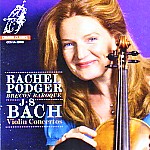It sometimes seems that many Baroque violinists never would have had careers as “normal” violinists–but this is certainly not the case with Rachel Podger. Although some of her work in music later than the Baroque period is less than convincing in its approach, there’s no question that she’s a top-notch musician, and she’s never made a finer (or smarter) recording than this. It’s a pleasure from first note to last.
First of all, it’s great seeing the two canonic Bach violin concertos not coupled with the usual “double” violin concerto (with the soloist playing both parts, of course). Instead, Podger offers transcriptions of two keyboard concertos, neither of which is usually thought to have been originally written for the violin. This makes less of a difference than you might think. The low tessitura of BWV 1055 may not offer Podger much of a technical challenge, but the sonorities recall the two strings-only Brandenburgs, and there are moments, such as her entry at the start of the finale, that are simply magical.
Both this work and BWV 1056 were likely composed for oboe (or oboe d’amore), but again, the delicious pizzicato Largo of the G minor concerto sounds wonderfully fresh and charming with a violin as soloist, and I don’t miss the honking and clicking of the usual Baroque oboe one bit. Which brings us to the next issue: Podger plays all of this music immaculately, with characterful ornamentation and (thank God) enough vibrato to achieve a distinctive cantabile tone, especially in the slow movements. Her moderate tempos in the allegros (the term means “lively”–not “like a bat out of hell”, as some authenticists apparently think) allow her to phrase the melodies with confidence, interact with and play off of the orchestra, and prevent Bach’s chugging rhythms from turning mechanical.
Brecon Baroque numbers just six players aside from Podger, which means essentially one player to a part. Yet the result never sounds thin or dry, thanks in large part to Channel Classics’ stunningly natural, warm SACD engineering (marvelous in regular stereo or multichannel formats). Also, and this really is a big deal, continuo player Christopher Bucknall uses a gentle, pleasant-toned instrument that never swamps the strings. The result is a true “chamber concerto” experience, an exquisite dialog that the players clearly relish while preserving the essential contrast between solo and tutti on which the concerto form depends. Highest recommendation. [11/10/2010]
































